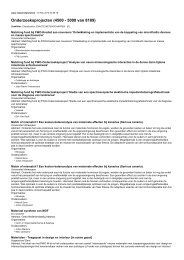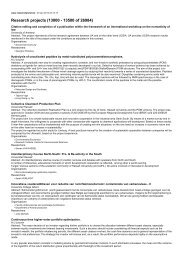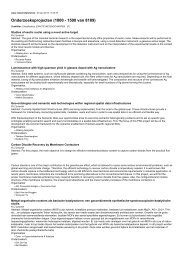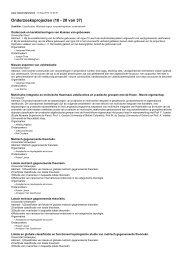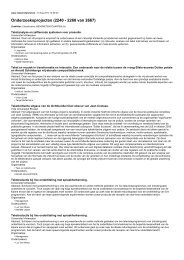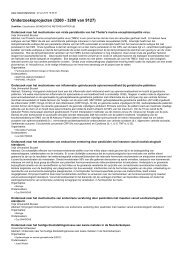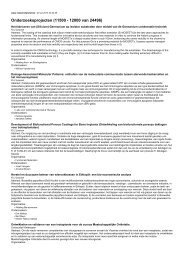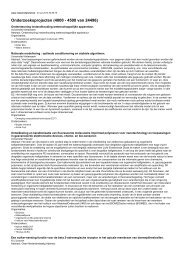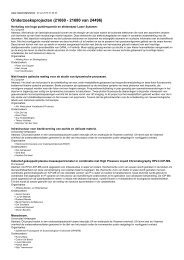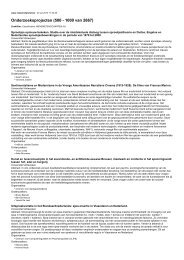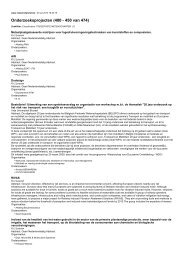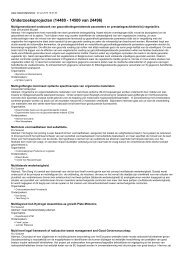Research projects (1 - 500 of 2917)
Research projects (1 - 500 of 2917)
Research projects (1 - 500 of 2917)
Create successful ePaper yourself
Turn your PDF publications into a flip-book with our unique Google optimized e-Paper software.
component <strong>of</strong> chivalrous identity as a legitimising construct <strong>of</strong>fering power to knights, noblemen and clerics alike.<br />
Organisations:<br />
• Department <strong>of</strong> History<br />
<strong>Research</strong>ers:<br />
• Jeroen Deploige<br />
Towards the development <strong>of</strong> ArcheoGML: a conceptual data model for a 4D archaeological GIS<br />
Ghent University<br />
Abstract: The proposed project consists <strong>of</strong> a first step towards a formal definition <strong>of</strong> a conceptual data model specifically designed for 4D<br />
archaeological data and analysis. The requirements <strong>of</strong> the archaeologists will take a central position in this development. The model will be<br />
gradually created using test cases on archaeological sites and continous feedback with the detected user requirements.<br />
Organisations:<br />
• Departement <strong>of</strong> Geography<br />
<strong>Research</strong>ers:<br />
• Philippe De Maeyer<br />
The serial nature <strong>of</strong> experimentation<br />
Ghent University<br />
Abstract: This project proposes a systematic, philosophical analysis <strong>of</strong> experimentation understood in terms <strong>of</strong> series. It aims to illuminate and<br />
understand how experiments connect sequentially, looking specifically at the early modern period, where serial experiments are abundant. Its<br />
hypothesis is that serial experimentation is used to generate knowledge.<br />
Organisations:<br />
• Departement <strong>of</strong> Philosophy and moral sciences<br />
<strong>Research</strong>ers:<br />
• Eric Schliesser<br />
• Maarten Van Dyck<br />
The tribuni plebis and the end <strong>of</strong> the Roman Republic<br />
Ghent University<br />
Abstract: The tribuni plebis are central in understanding the political power <strong>of</strong> socio-political groups in Roman society. They had massive influence<br />
in the late Republic, and are <strong>of</strong>ten linked with the transformation into the Principate. My study will provide a more correct image <strong>of</strong> them through the<br />
use <strong>of</strong> a socio-political methodology, based on principal-agent analysis and models <strong>of</strong> social conflict.<br />
Organisations:<br />
• Department <strong>of</strong> History<br />
<strong>Research</strong>ers:<br />
• Andries Johan Zuiderhoek<br />
Quintus Smyrnaeus' Posthomerica: an analysis in a diachronic and synchronic literary field<br />
Ghent University<br />
Abstract: The subject <strong>of</strong> my research project is the literary analysis <strong>of</strong> a late antique Greek author (Quintus <strong>of</strong> Smyrna), who figures in a<br />
contradictory literary tradition. I will investigate his literary position by means <strong>of</strong> a narratological analysis <strong>of</strong> his epic 'Posthomerica' and<br />
an intertextual comparison to relevant diachronic and synchronic sources, from Homer onwards.<br />
Organisations:<br />
• Departement <strong>of</strong> French<br />
<strong>Research</strong>ers:<br />
• Krist<strong>of</strong>fel Demoen<br />
Ferociously female Kali in Kerala: from tribal to deity to pan-Hindu goddess. Reviewing a religious process <strong>of</strong> assimilation<br />
and co-optation in a feminine context.<br />
Ghent University<br />
Abstract: This project will provide a contextualized study <strong>of</strong> goddess worship in the South Indian state Kerala. We will reconstruct the centuries-long<br />
evolution that purged a tribal deity from her folklore characteristics and show how goddesses at the margins have succeeded in gaining a place at<br />
the central Hindu pantheon. Simultaneously our results will be embedded in Kerala's unique feminine history.<br />
Organisations:<br />
• Departement <strong>of</strong> Languages and cultures <strong>of</strong> South and East Asia<br />
<strong>Research</strong>ers:<br />
• Eva De Clercq<br />
Generalisation <strong>of</strong> exteroceptive and interoceptive cues.<br />
K.U.Leuven<br />
Abstract: No English Abstract<br />
Organisations:<br />
• Psychology <strong>of</strong> Learning and Experimental<br />
<strong>Research</strong>ers:<br />
• Tom Beckers<br />
• Dirk Hermans<br />
Antwerp Yiddish Noun Plurals (AYNP).<br />
University <strong>of</strong> Antwerp<br />
Abstract: The project will explore structure and acquisition in contemporary Yiddish used by the Jewish Ultra-Orthodox community in Antwerp,<br />
Belgium. This community lives in a unique multilingual situation that includes three main languages: Yiddish and Dutch - two living languages<br />
competing as native tongues, and Loshn Koydesh (Classical Hebrew) - restricted only for praying and not used for daily communication. Our<br />
window onto native Antwerp Yiddish is the system <strong>of</strong> noun plurals, whereby a singular noun takes on a plural suffix. The aim <strong>of</strong> the project is tw<strong>of</strong>old:<br />
first, to describe the system <strong>of</strong> noun plurals as it is currently used by adults, taking into account the intensive contact with Dutch, and second,<br />
to understand how this system is acquired by children from the same community.<br />
Organisations:<br />
• Centre for Computational Linguistics and Psycholinguistics (CLiPS)<br />
<strong>Research</strong>ers:



